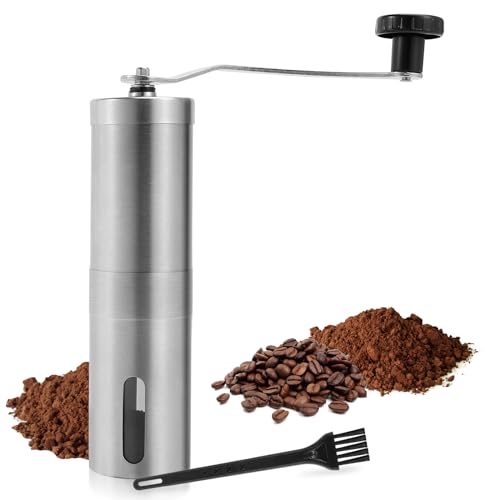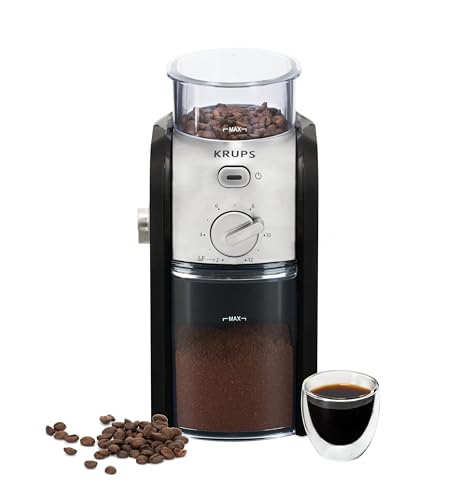What's The Current Job Market For Grinders Organic Coffee Beans Profes…
Page Information

Content
 Grinders - Organic Coffee Grown Without Pesticides and Herbicides
Grinders - Organic Coffee Grown Without Pesticides and HerbicidesGrinders is Australia's most popular brand of coffee, and has earned the top three spots in Canstar Blue's"best coffee" survey. It's grown on farms without chemical fertilizers, pesticides or herbicides.
The use of a pour-over helps brew the beans thoroughly to bring out subtleties and balance flavor. The size of the grind is important.
Consistency
Anyone who is concerned about precision and consistency in their brewing will benefit from a quality grinder. The best grinders provide an exact grind that enables baristas and coffee drinkers to enjoy the same stainless steel coffee grinder in every cup. The grinder's consistency is even more crucial when a cafe is serving different kinds of coffees, since each will require a different grind to extract its full flavor.
The efficiency of a grinder can be dependent on how often it is cleaned. If organic matter is accumulating in the nooks and crannies of its blades and burrs they can alter the taste of the brew. This is the reason it's essential to use the correct cleaning products, like those made specifically for grinders. These tablets are designed for soaking up the oils that stick to the internal surfaces of the grinder, and then removing them completely.
The ability of a grinder to create an accurate grind is determined by the grinding mechanism it employs. There are two main types of grinders namely burr and blade. Blade grinders coffee beans operate by spinning a number of teeth that cut and shave beans. Burr grinders have two cones that rotate in an opposite directions, and shave beans into an extremely fine grind. Burr grinders are typically more expensive than blade grinders, however they provide greater precision.
Any coffee lover must choose the right grinder, and keep it clean. To keep a grinder clean, it is best to use it to grind coffee. Don't use it for other tasks such as food processing and mixing. The grinder will become duller or wear out faster when it is used for other tasks. This can alter the final brew.
It's recommended to inspect the hopper regularly. If the beans are weighed down, they can cause the grinder to overheat and give inconsistent results. The hopper shouldn't be more than half full.
Another thing to take into consideration is the time when the beans were roasting. The longer the beans have been ground and degraded, the more which could lead to an under extraction of aromatic compounds in brewing. This issue can be solved easily by grinding the coffee beans slightly finer.
Freshness
Freshness is one of the most important factors that determine the quality of your coffee. Sadly unlike other foods sold in the grocery store with their clearly printed expiration dates, coffee beans deteriorate much more slowly than we think. This gradual deterioration is because of the interaction of the molecules of a bean with oxygen. This process is called oxidation, and can ruin the delicate flavors and aromas that are the basis of delicious coffee drinks.
While this process can happen over time even when beans are kept in a refrigerator that is airtight the process accelerates dramatically after beans have been ground. Ground beans have a bigger surface area and are more exposed to the elements. The elements of heat, oxygen and UV rays can all accelerate the degrading process of coffee beans.
This is the reason whole bean coffee lasts for a long time while pre-ground coffee goes stale far faster. You can tell if your coffee is old by taking a whiff or a look. Coffee beans that have been brewed for a long time have little or no aroma while the grounds that are stale have a musty, rotten smell.
There's a straightforward way to extend the freshness period for ground coffee. It involves placing it in containers that do not contain oxygen and has a lid that can be sealed. This simple method is efficient for extending shelf life of food products. Other storage options, in addition to a canister that is vacuum sealed, include resealable bags containing an air-sucked out portion.
If you're not able to find a suitable storage method, try freezing your coffee beans. You don't want to let them completely freeze, as it can cause a loss in flavor and even moisture. However, you can refreeze the beans for up to 2 months. Make sure they are in a non-oxygen-free container and do not open them before the timer expires.
If you're a pro at coffee or are just beginning using a grinder, it's an ideal tool to extract the most from your favorite beans. By taking a few more minutes each day will allow you to enjoy your coffee as a connoisseur and bring out the wonderful qualities of every roast.
Value
Many people shop for organic foods because they believe that anything without pesticides is healthier for you. This assumption is not always true, however, when it comes to coffee. Organic certifications can be expensive for farmers and usually result in a lower price for the beans. This leaves small, quality-focused farms not able to afford the expense and unable to take on the risk of organic certifications. Only large, middling-quality farms will pay for these certifications. They can gain many dollars from the label.
Grinders is a company that is located in Melbourne, Australia, has a loyal following thanks to the high-quality coffee it produces. Its grinders feature ceramic burrs that are adjustable and sprint-mounted which cut the beans rather than crack them, to give a smoother taste. The beans are certified by Rainforest Alliance certification and cost $21 per kilo. They are medium-roasted and have nutty, fruity, and chocolatey flavours.
The company's coffee was recently placed third in Canstar Blue's survey of best budget espresso grinder Australian roasters, and received four stars for customer satisfaction and quality for price. It also received the coveted Good Food Australia award for coffee beans grinder machine and accessories.
Environment
Many people who buy organic coffee do so for environmental and health reasons, as the process of growing is free of chemical fertilizers and pesticides. This results in less waste and better utilization of the resources of the land and water. Additionally, coffee farmers generally receive higher prices at the farmgate for organically grown beans, which makes it easier for them to cover the costs of other farm inputs.
The organic growing process is governed by the National Organic Standards, which includes strict guidelines for soil management, water and air quality as well as pest and weed control and more. In addition, growers must keep their harvests and processing materials distinct from non-organic coffee as well as other products. To accomplish this, they should use bags and bins that clearly labeled as organic coffee. Additionally, the storage and processing areas should be clean. The bags and bins must be free of contamination from sanitizers, chemical pesticides as well as residues from fertilizers made of non-organic substances and any other chemicals that may be used in the roasting or processing process.
In the mountains of Latin America, small family farms usually cultivate organic coffee. These farms produce specialty beans that have unique characteristics such as floral complexity or acidity. Organic coffee is typically produced in nutrient-rich, rich soil in natural shade and at an altitude of.
A grinder is an essential tool in the process of turning raw green coffee into roasted, ground compact coffee grinder. The process of grinding increases the amount of organic molecules present in coffee that are roasted and affects the flavor profile. The temperature of the coffee bean during the grinding process can have a significant impact on the final taste.
Room temperatures coffee particles tend to grind finer than those with cooler temperatures due to the lower temperature of the particles. This may result in a more uniform size distribution. As shown in Fig., the modal particle distribution gets smaller as cooling speeds increase. 4. The resultant grind profile is less Gaussian and has an incline of about 9.5mm.
 The cost of organic certification can be prohibitive for small coffee farmers, particularly those working in the low-income segment. Farmers are already subject to a variety of financial risks, such as climate change and food price fluctuations, and they are unlikely to invest in the extra costs of organic certification. Many of these farmers continue to cultivate organic coffee because it provides an increased stability in the market and helps them to maintain the income they earn.
The cost of organic certification can be prohibitive for small coffee farmers, particularly those working in the low-income segment. Farmers are already subject to a variety of financial risks, such as climate change and food price fluctuations, and they are unlikely to invest in the extra costs of organic certification. Many of these farmers continue to cultivate organic coffee because it provides an increased stability in the market and helps them to maintain the income they earn.- PreviousThe Step-By -Step Guide To Choosing Your Bentley Smart Key 24.10.24
- Next5 Killer Quora Answers On Strollers 3 Wheels 24.10.24
Comment list
There are no registered comments.
